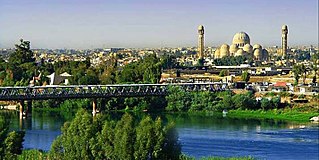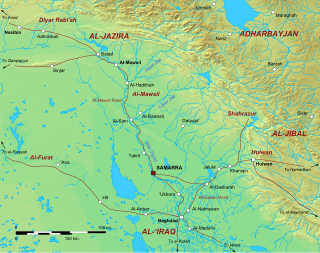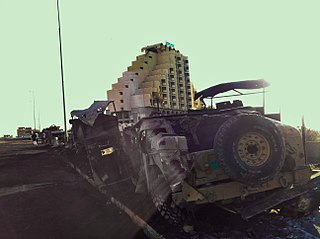Related Research Articles

Mosul is a major city in northern Iraq, serving as the capital of Nineveh Governorate. The city is considered the second-largest city in Iraq in terms of population and area after the capital Baghdad, with a population of over 3.7 million. Mosul is approximately 400 km (250 mi) north of Baghdad on the Tigris river. The Mosul metropolitan area has grown from the old city on the western side to encompass substantial areas on both the "Left Bank" and the "Right Bank", as locals call the two riverbanks. Mosul encloses the ruins of the ancient Assyrian city of Nineveh – once the largest city in the world – on its east side.

The Uqaylid dynasty was a Shia Arab dynasty with several lines that ruled in various parts of Al-Jazira, northern Syria and Iraq in the late tenth and eleventh centuries. The main line, centered in Mosul, ruled from 990 to 1096.

Kurdistan Socialist Democratic Party is a political party in Kurdistan Region. The first leader was Saleh Yousefi after 1981. After 1992, the party was led by Mahmoud Othman. The party is currently led by Mohammed Haji Mahmoud. It is a splinter of the Kurdistan Democratic Party.

Qaraqosh, also known as Al-Hamdaniya or Bakhdida, is an ethnically Assyrian city in Iraq within the Nineveh Governorate, located about 32 km (20 mi) southeast of the city of Mosul and 60 km west of Erbil amid agricultural lands, close to the ruins of the ancient Assyrian cities Kalhu and Nineveh. It is connected to the main city of Mosul by two main roads. The first runs through the Assyrian towns of Bartella and Karamlesh, which connects to the city of Erbil as well. The second, which was gravel before being paved in the 1990s, is direct to Mosul. All of its Assyrian Christian citizens fled to the Kurdistan Region after the ISIS invasion on August 6, 2014. The town was under control of ISIS until October 19, 2016, when it was liberated as part of the Battle of Mosul after which residents have begun to return.

The Battle of Mosul was a battle fought during the Iraq War in 2004 for the capital of the Ninawa Governorate in northern Iraq that occurred concurrently to fighting in Fallujah.

Al-Shirqat District is a district of Saladin Governorate, Iraq. The district's capital is the town of Al-Shirqat. Other settlements include Khanugiyah, Mukhayim, Qaryat al Ḩūrīyah al Jadīdah, Al-Khadraniyah, Aynah, Ijamasa, and Jamaf. The ancient site of Assur is also located in the district.

Mosul Eyalet was an eyalet of the Ottoman Empire. Its reported area in the 19th century was 7,832 square miles (20,280 km2). The eyalet was largely inhabited by Kurds.

The Great Mosque of al-Nuri was a mosque in Mosul, Iraq. It was famous for its leaning minaret, which gave the city its nickname "the hunchback". Tradition holds that the mosque was first built in the late 12th century, although it underwent many renovations over the years. The mosque withstood various hostile invading forces over its 850-year history until it was destroyed, along with its distinctive minaret, in the Battle of Mosul in 2017.
Al-Shirqat is a town west of the Tigris in Saladin Governorate, Iraq, located 294 kilometres northwest of Baghdad. It is the main town of the Al-Shirqat District, and is near the ruins of the ancient Assyrian city of Assur.

The Kharijite Rebellion was a major Kharijite uprising against the Abbasid Caliphate between 866 and 896. Centered in the districts of Mosul and Diyar Rabi'a in the province of al-Jazira, the rebellion lasted for approximately thirty years, despite numerous attempts by both the central government and provincial authorities to quell it. It was finally defeated in 896 after the caliph al-Mu'tadid undertook several campaigns to restore caliphal authority in the region.

The Battle for Mosul Dam was a battle that took place in August 2014 between militants of the Islamic State of Iraq and the Levant (ISIL) and Kurdish Peshmerga forces, supported by Iraqi troops and U.S.-led Coalition airstrikes.
This is a timeline of events during the War in Iraq in 2015.

The fall of Mosul occurred between 4 and 10 June 2014, when Islamic State (IS) insurgents, initially led by Abu Abdulrahman al-Bilawi, captured Mosul from the Iraqi Army, led by Lieutenant General Mahdi Al-Gharrawi.

The Mosul offensive (2015) was an offensive launched by Kurdish Peshmerga forces on 21 January 2015, with the objective of severing key ISIL supply routes to Mosul, Iraq, and to recapture neighboring areas around Mosul. The effort was supported by US-led coalition airstrikes. The Iraqi Army was widely expected to launch the planned operation to retake the actual city of Mosul in the Spring of 2015, but the offensive was postponed to October 2016, after Ramadi fell to ISIL in May 2015.
Morteza Mirza Afshar was an Afsharid prince and the son of Nader Shah of Persia, who was renamed Nassrollah Mirza in honour of his role in the victory at Karnal. He proved to be a talented military leader and demonstrated his worth during the battle of Karnal by commanding the centre of the Persian army which defeated Sa'adat Khan's forces and captured his person.
On 8 February 2016, the Islamic State of Iraq and the Levant executed over 300 police and army personnel, as well as civil activists by a firing squad in Mosul, Iraq.

The Battle of Mosul was a major military campaign launched by the Iraqi Government forces with allied militias, the Kurdistan Regional Government, and international forces to retake the city of Mosul from the Islamic State (ISIL), which had seized the city in June 2014. The battle at the time was the world's single largest military operation since the 2003 invasion of Iraq and was considered the toughest urban battle since World War II. The operation, dubbed Operation "We Are Coming, Nineveh", began on 16 October 2016, with forces besieging ISIL-controlled areas in the Nineveh Governorate surrounding Mosul, and continued with Iraqi troops and Peshmerga fighters engaging ISIL on three fronts outside Mosul, going from village to village in the surrounding area in the largest deployment of Iraqi troops since the 2003 invasion of Iraq.

Najim Abdullah al-Jubouri is an Iraqi Major General and governor. Al-Jubouri commanded Iraqi Army forces attempting to oust the forces of the Islamic State of Iraq and the Levant from the Nineveh Governorate during the Battle of Mosul (2016–2017). As of 2020 he is serving as the governor of the Province of Nineveh.
The Hamam al-Alil massacre was the killing of at least 300 civilians in the town of Hamam al-Alil in Iraq's Nineveh Governorate by the Islamic State of Iraq and the Levant (ISIL) in late October and early November 2016. The event took place within a larger ongoing assault on the city of Mosul by a wide coalition of anti-ISIL forces, which managed to capture Hamam al-Alil on 7 November.
The timeline of the Battle of Mosul (2016–2017) is divided into the three phases.
References
- ↑ Runciman, Steven (1951). "Chapter VI: Equilibrium in the North". A History of the Crusades . Vol. 2. Cambridge University Press. p. 110. ISBN 9780521347716.